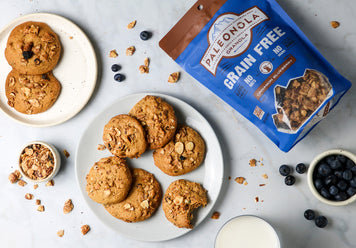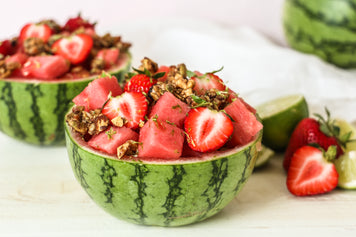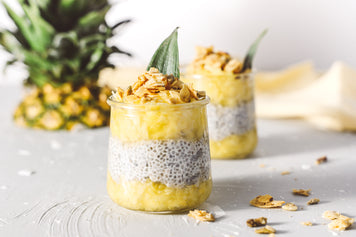Disclaimer: article below is for information purposes only and not considered medical advice. Seek professional opinions before starting any diet or exercise routine.
Sugar. Is it the devil? Or, when used appropriately, the one thing keeping you sane?
Most people don’t even think twice about sugar. A glass of orange juice and a can of coke all look the same. And while they pretty much are, the world of “sugar” can get complicated fast.
White powder. Yes, it’s true, can feel very addicting. That’s because when you ingest sugar (come on, what other white powder were you thinking?) there are a series of chemical reactions that take place and activate dopamine.
Dopamine is your pleasure center. A complicated scientific explanation of how dopamine works can be found online. For now, let's keep it simple.
It’s the reward neurotransmitter that communicates messages to the brain. It’s also the reason why Pavlov could get dogs to do whatever he wanted.
The problem isn’t ringing the dopamine bell once and a while. The problem is when it feels great, we want more. Too much sugar can lead to several health problems. These include obesity, type 2 diabetes, and heart disease.
Yes, by now we know sugar is naturally in many foods, such as fruits, vegetables, and dairy products. But most of the sugar we consume comes from processed foods in the form of added sugars. The typical shiny processed foods and beverages you see everywhere. Thank you, big gulps, rings pops, and sour peach rings.
But like any clever American, when we have a problem, we try to fix it. Sometimes our attempts at fixing leave us worse off. In our attempt to find a better way to sweeten up, a world of sugar alternatives and lab made sweeteners exploded.
Think back to the 80s when it was all about the Sweet-N-Low. Then, after pumping truckloads of this god-awful excuse for sugar into our veins, people found out that it might possibly cause cancer in lab rats at high dosages. Yikes. So, we needed a way to find something else. Not good. Then, we moved on to the next colorful packet of dust. And whether it was pink, blue, yellow, or just plain diner white, the packets kept coming.
Sugar is a masking agent. It makes horrible food taste better. It's a way to make a bitter food a bit more tolerable. But if consumed in small quantities and with the right foods, it can be an enjoyable experience that’s neither addicting nor harmful. Let's take a closer look at the forms of sugar we see brands hawking as healthy these days.
Natural Sugars:
Natural sugars are the sugars found in fruits, vegetables, and dairy products. These sugars are naturally occurring and provide our bodies with glucose. This fuel gets stored and used for energy when it’s needed.
A vote for natural sugars is really a vote for real food.
When we consume natural sugar, it’s usually packaged in a way that brings other beneficial elements. Things like vitamins, fiber and other essential nutrients, that slow down the absorption of sugar in our bloodstream.
Which is why fruit isn't all that bad. Some people would disagree, but the pros of eating berries outweigh the cons.
These natural sugars come in a variety of fruits. Mixing these fruits with fibrous environments is a way to make it more glucose friendly. And making sure we’re not jacking up the blood sugar levels too often is a key player in longevity. As with anything you can have too much of a good thing. But it's better to play the natural card than any of the designer sugars below.
Sugar Alternatives:
Sugar alternatives are synthetic or plant-based sweeteners. These are used to replace sugar in many processed foods and beverages. The natural foods industry loves these. Insert mega eye roll. Some popular sugar alternatives include stevia, monk fruit, and erythritol. Sugar alternatives are often touted as healthier options because they contain fewer calories and may not cause spikes in blood sugar levels.
I've never bought this. The thing that no one considers when they ram these sugars down consumers throats, is the fact that there’s still a possible hormone response. What's going on inside the body is impossible to track for most people. And although we look at blood sugar levels and assume everything is hunkey dorey, we don’t know what pinball machine confusion is happening inside.
It is important to note that some sugar alternatives may also have negative side effects you can feel. These can include bloating, gas, and digestive discomfort. But the real kicker here is that their taste is immediately distinguishable. And disgusting if not used correctly.
It can make 3 different products all taste the same. Ever try something and not realize there’s stevia in it? Not that fun. It's like your brain and your tongue just know something's off. This is why we never use them in any of our products. It just seems unnatural even if they’re derived from something natural.
Sugar Alcohols:
Sugar alcohols are another type of sugar alternative that is commonly used in low-calorie and sugar-free products. Remember the low-fat craze? Snack-wells, anyone? Sugar alcohols, such as xylitol, maltitol, and isomalt, are derived from natural sources and are only partially absorbed by the body. Did you catch that? Derived-from-natural-sources.
If you investigate how they make sugar alcohols, it’s not a very natural and simple process. Some people argue that they are a good option for people who are watching their sugar intake, but we believe this couldn’t be further from the truth.
If you’re watching you’re sugar intake, you wouldn’t want to roll the dice on something that you have no idea how your body is reacting to on the inside. It's a bit of a second order consequence. We fixed one thing over here, only to find out we've created another issue.
But we continue to see products on the market with loads of sugar alcohols because of one main reason.
They look good on a nutritional panel.
Zero sugars are appealing. If the sugar column says zero sugars but the sugar alcohols say 15 then everything is all good. Right? Not so fast.
Food manufactures go the extra mile and use the fiber to deduct net carbs to take this label façade even further. This is why we put everything on our label and don’t try to be sneaky. Besides, people are way "smarter" today than they were in the 80’s. Thank you iPhone. Yet, sugar alcohols can also cause digestive discomfort and bloating in some people, especially when consumed in large amounts.
Impact on Gut Health:
Sugar, natural or otherwise, can have a negative impact on our gut health. The overconsumption of sugar can lead to an overgrowth of harmful bacteria in our gut. This can disrupt the delicate balance of good bacteria in our gut and lead to digestive problems. Problems such as bloating, gas, candida, and diarrhea. That doesn’t sound like much fun. But here’s where things get interesting.
When most people talk about sugar, the discussion is primarily what we’ve outlined above. However, there’s much more to it. High sugar doesn’t only come from the powder or liquid forms directly but also sneaks up on us indirectly.
How? By consuming excess carbohydrates in large amounts.
Excess consumption of carbohydrate-based foods can create a very similar impact on health. It's sugar in disguise. This is because once an ingested carbohydrate is converted into glucose (sugar) the body needs to figure what to do with all the excess. It's either stored for later or used instantly. So, we really should add excessive carbohydrate consumption to the banditos of the bad sugar gang.
Sugar alternatives and sugar alcohols can also have an impact on our gut health. This is especially true if they are consumed in large amounts. We mentioned some sugar alternatives can be poorly absorbed by the gut, leading to bloating, gas, and digestive discomfort. But did you know sugar alcohols can ferment in the gut? This leads to an overgrowth of harmful bacteria and digestive problems.
So, where do we go from here? Natural sugars, sugar alternatives, and sugar alcohols all have their pros and cons. Natural sugars will always be a healthier option because they come packaged with essential nutrients, vitamins, and fiber. And let's face it, foods better from a tree than a lab. But they should still be consumed in moderation.
Sugar alternatives and sugar alcohols can seem like a good option for people who are watching their sugar intake but be mindful of their potential side effects. Consume them in moderation and at your own risk. We think that it’s best to avoid them unless there’s no better options around.
Anything in moderation can be a good approach to sugars. Stick to natural sources of sugar when you opt for something sweet. Try to avoid the gastric consequences sugar alcohols can bring.
No one wants a blowout on the golf course during a mid-summers day when all you brought with you are fancy “protein” bars. Keep it simple. Read the labels.
Eat real foods.





